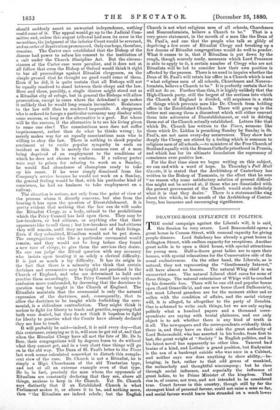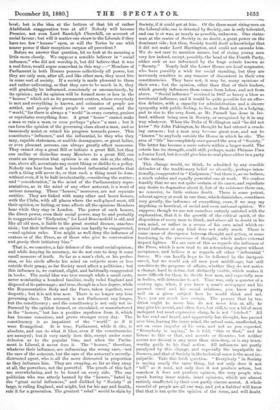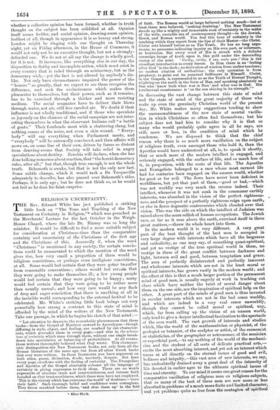DRAWING-ROOM INFLUENCE IN POLITICS.
THE social campaign against the Liberals will, it is said this Session be very severe. Lord Beaconsfield opens a great house in Curzon Street, with unusual capacity for giving people dinners. Lord Salisbury has already a great house in Arlington Street, with endless capacity for receptions. Another great noble is to open a third house, with special attractions for young men. Half-a-dozen great ladies are to open their houses, with special relaxations for the Conservative side of the usual exclusiveness. On the other hand, the Liberals, as is natural, they not representing the "Gentlemanly Interest," will have almost no houses. The natural Whig chief is an unmarried man. The natural Liberal chief cares for none of these things. The natural entertainer of Whigs will be crushed by his domestic loss. There will be one old and popular house open (Lord Granville's), and one new house (Lord Dalhousie's), but most Liberal grandees are for the moment either sad or sullen with the condition of affairs, and the social victory will, it is alleged, be altogether to the party of Zenobia. One is ashamed to write such things, but we are only saying politely what a hundred papers and a thousand corre- spondents aro saying with brutal plainness, and our only object is to ask whether there is any kind of truth in it all. The newspapers and the correspondents evidently think there is, and they have on their side the great authority of Lord Beiconsfield, who has asserted in his books, from first to last, the great weight of " Society " in English politics, and in his latest novel has apparently no other idea. Tancred had brains of a kind, and Lothair a grand position, but Endymion is the son of a bankrupt suicide who was once in a Cabinet, and neither says nor does anything to show ability,—be- longing, in fact, rather to that odd genus of mankind, the melancholy and thoughtful nincompoop ; but he rises through social influence, and especially the influence of great ladies, to be Prime Minister of the kingdom. That rise is, of course, not true, and not intended to be considered true. Court favour in this country, though still by far the strongest kind of personal favour, could not raise a man so far, and social favour would leave him stranded on a much lower
level; but is the idea at the bottom of that bit of rather Aladdinish exaggeration true at all P Nobody will become Premier, not even Lord Randolph Churchill, on account of social favour ; but will it matter one straw to the Liberals if they have too few "houses" open, or will the Tories be one whit nearer power if their receptions surpass all precedent ?
Before we answer that question, let us look at its meaning a little more closely. We suppose a sensible believer in "social influence," who did not worship it, but did believe that it was a real force, would argue somewhat in this way :—" Members of Parliament in both Houses possess collectively all power, but they are only men, after all, and like other men, they must live in some sort of society. If a society is made pleasant to them and rather enlivening, so that they care to be much in it, they will gradually be influenced, consciously or unconsciously, by its opinion ; and its opinion will be formed more or less in the " houses " which act ILS its permanent centres, where everybody is met and everything is known, and estimates of people are settled, and gossip about people is sent around, and the "world," for there is always a " world" in every country, praises or reprobates everything done. A great "house" cannot make a man or rain a man, or even perhaps "place "a man ; but it can form the opinion of the governing class about a man, and so immensely assist or retard his progress towards power. This constitutes "influence," and the influential, be they who they may, capable statesmen, or audible demagogues, or great ladies, or even pleasant persons, can always greatly affect measures. They cannot stop a great Bill or initiate a great Bill, but they can incline or disincline many Members to a great Bill, can create an impression that opinion is on one side or the other, can, above all, accentuate any secret liking or dislike to a policy. Nobody can hear from half a hundred influential months that such a thing will never do, or that such a thing must be done, without even, if it be half-involuntarily, considering the matter ; and "consideration," in the mind of the Parliamentary repre- sentatives, as in the mind of any other autocrat, is a word of serious meaning. These "houses," moreover, are not separate entities. They are linked with many other and lesser houses, with the Clubs, with all places where the well-placed meet, till their opinion, or feeling, or tone affects all the opinions Members hear while they stay in London. The power of such houses, the direct power, even their social power, may be and probably is exaggerated in "Endymion," for Lord Beaconsfield is old, and like all old men, is liable to the great mental disease, anachro- nisia ; but their influence on opinion can hardly be exaggerated, —and opinion rules. You might as well deny the influence of orators or of the Press, as of those who give to conversation and gossip their initiatory bias."
That is, we conceive, a fair defence of the usual social opinion ; and, while denying its accuracy, we do not care to deny it some small measure of truth. So far as a man's club, or his profes- sion, or his circle affects his mind on subjects more or less outside their grasp, so far Society must affect a politician ; but this influence is, we contend, slight, and habitually exaggerated in books. The social idea was true enough while a small caste, never numbering a hundred families, really ruled England and disposed of its patronage ; and true, though in a less degree, while the Representative Body and the Peers, taken together, were despotic ; but it is not true now. There is no longer any true governing class. The autocrat is not Parliament any longer, but the constituency ; and the constituency is not only not in- fluenced by the opinion formed, or circulated, or manufactured in the "houses," but has a positive repulsion from it, which has become conscious, and grows stronger every day. The constituency is as impatient of the " world " as if it were Evangelical. It is true, Parliament, while it sits, is absolute, and can do what it likes, even if the constituencies are annoyed; but it very rarely does this, except under some delusion as to the popular bias, and when the Parlia- ment is Liberal, it never does it. The "houses," therefore, whatever their influence, are influencing the wrong ears,—not the ears of the autocrat, but the ears of the autocrat's secretly- distrusted agent, who is all the more distrusted in proportion as they influence him. They are swaying, so far as they sway at all, the powerless, not the powerful. The proofs of this fact are overwhelming, and to be found on every side. The one politician who was utterly banned by the "houses," hated by the "great social influences," and disliked by " Society " at large, is ruling England, and might, but for his age and health, rule it for a generation. The greatest "rebel" would be slain by Society, if it could get at him. Of the three most rising men on the Liberal side, one is detested by Society, one is only tolerated, and one is or was, as nearly as possible, unknown. One states- man at the centre of Society is, no doubt, a great power on the dominant side; but then, Society would itself acknowledge that it did not make Lord Hartington, and could not unmake him. We do not care to mention names, but of rising young men very few indeed, except, possibly, the head of the Fourth Party, - either seek or are influenced by the huge coterie known as "Society." Nearly half the Lower House are local magnates, who have possibly a wish for social standing, but they are nervously sensitive to any rumour of discontent in their own constituencies. They have not, it may be, many opinions of their own ; but the opinion, other than that of their leaders, which gravely influences them conies from below, and not from above. "Social influence" received in 18(17 as heavy a blow as territorial influence, and it would be quite possible for an effec- tive debater, with a capacity for administration and a sincere sympathy with public feeling, to live, as Deak did, in a lodging, and to rise to the very front, as Mr. Parnell has done in Ire- land, without being seen in Society, or recognised by it in any way whatever. When the Duke of Wellington said "be did not know" Sir John Pakington, he thought he had uttered a crush- ing sarcasm ; but a man may become great now, and not be " known " to anybody outside the House in which he sits. The area of "life" has completely over-passed the area of "Society." '['he latter has become a mere coterie within a larger world. The coterie has its strength, could still, perhaps, make Phineas Finn a Junior Lord, but it could give him no real place either in a party or the nation.
This change would, we think, be admitted by any sensible defender of the traditionary belief so absurdly, perhaps inten- tionally, exaggerated in" Endymion ;" but there is, as we believe, a much subtler and equally powerful one at work. We confess frankly that we are not quite certain of its cause, and repudiate any desire to dogmatise about it, but of its existence there can, we conceive, be little serious doubt. There is some potent, solvent agency at work in our time, which diminishes, sometimes very greatly, the influence of everything, even, if we may say anything so heretical, of social and even national opinion. We suppose, though we are not ourselves entirely satisfied with the explanation, that it is the growth of the critical spirit, of the disposition of every man to think, and above all to doubt in his own mind, or rather in a recess of his own mind which ex- ternal influence of any kind does not really reach. There is some cause of divergence between thought and action, or some hardening in the processes of thought, which makes external impact lighter. We are sure of this as regards the influence of the Press, which is now read to an astonishing degree without acceptance, and believe it as regards all other " influential " forces. We can hardly hope to be followed by the inexperi- enced, but we would ask all men past middle-age, but still sensitive to the progress of affairs, whether they do not notice a change, hard to define, but distinctly visible, which makes it more difficult for them to decide how men, and especially men in bodies, will determine to act. Time was, only a gum ter of a century ago, when, if you knew a man's newspaper and his avowed creed and his social relations, you knew pretty well on a given subject how he would think and act.
Now, you are much less certain. The powers that by tra- dition ought to move him do not move him at all ; he may give his assent, and often does, but, still, to use a bit of most inelegant but most expressive slang, he is not "fetched." All he has read and heard, and apparently has thought, has passed over him, leaving the inner mind, the actual man, unaffected, to act on sonic impulse of his own, and not as you expected.
"Everybody is saying," he is told, "this or that," and he listens to this or that, and assents or dissents ; but neither assent nor dissent is any more than skin-deep, or is any trust- worthy guide to his final action. All influences are partly paralysed by this change, and especially the impalpable in- fluences, and that of Society in the technical sense is the most im-
palpable. Take this Irish question. " Everybody " in Society is saying nearly the same thing, but not only does it not
"tell" as it used, not only does it not produce action, but somehow it does not produce opinion, the very people who speak having inner minds, inner opinions, which are almost entirely unaffected by their own partly sincere assent. A whole roomful of people are all one way, and yet a habitue will know that that is not quite the opinion of the room, and will doubt
whether a collective opinion has been formed, whether in truth thought on the subject has been solidified at all. Opinion itself seems feebler, and social opinion, drawing-room opinion, feeblest of all, though in appearance it is so breezy and strong. London might be ringing with one thought on Thursday night, yet on Friday afternoon, in the House of Commons, it would not only not be an executive thought, but not a strongly- defended one. We do not at all say the change is wholly good, for it is not. It increases, like everything else in our day, the disposition to flabby and incomplete action, which must exist in every country that is ruled through an aristocracy, but as the democracy wish,—yet the fact is not altered by anybody's dis- like. Not only have circumstances impaired the power of the " houses " so greatly, that we expect to see them recognise the difference, and seek the exclusiveness which makes them pleasanter to themselves, but their power, such as it remains, has to be exercised through a thicker and more resisting medium. The social magnates have to deliver their blows through water, not air, still less rarefied air. We doubt if their influence is not wholly traditional, and if those who speculate so joyously on the chances of the social campaign are not inter- esting themselves in what the observant Indians call "a battle of goats." Their foreheads meet with a shattering clang, but nothing comes of the noise, not even a skin wound. " Every- body " will say everything when Parliament meets, and " everybody " will be outwardly convinced, and then affairs will move on, on some line of their own, driven by forces so distant from drawing-rooms that Society will take relief in angry speculations about .destiny. Zenobia will declare, when she has done talking nonsense about reaction, that "the horrid democracy rules, after all ;" but that, though true enough, is not the whole truth. Behemoth is awake, but that is not the only new fact. Some subtle change, which it would task a De Tocqueville adequately to describe, has also passed over Behemoth's rider. Perhaps, it is only age ; but he does not think so, or he would not feel as he does his faint surprise.




































 Previous page
Previous page